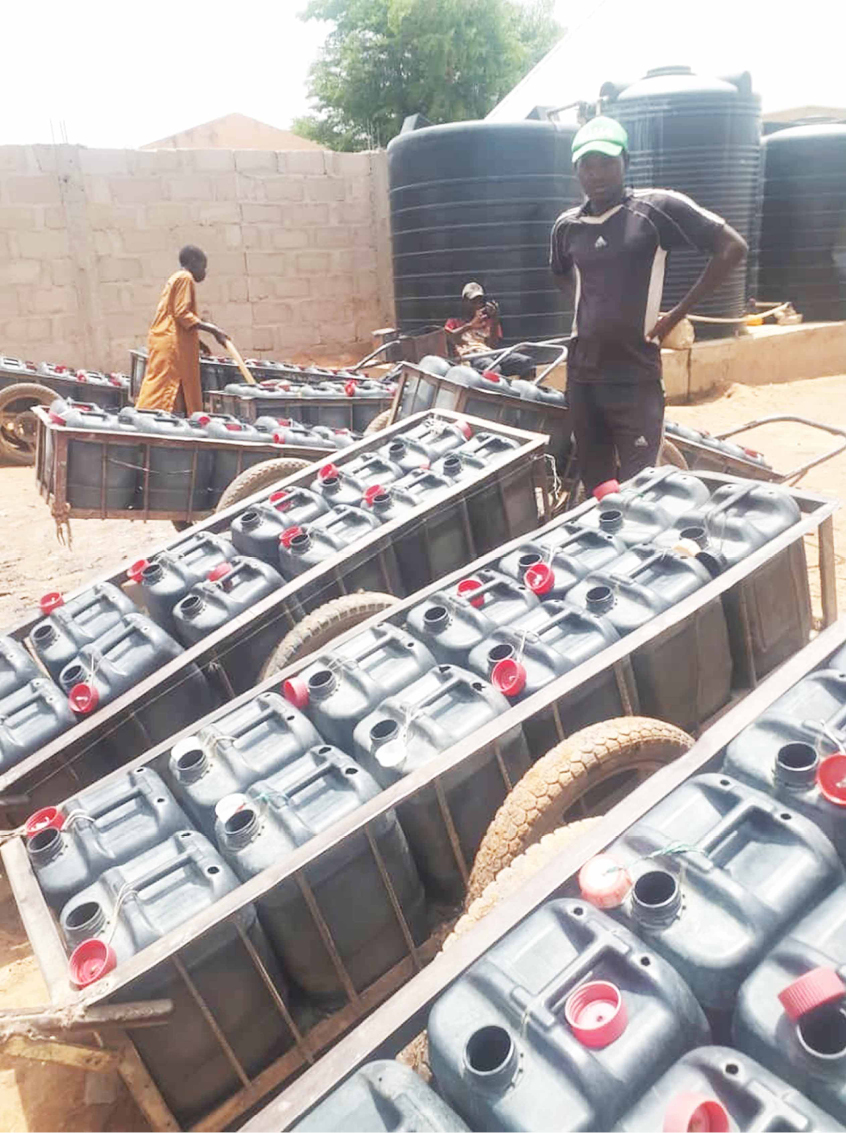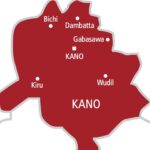The residents of Damaturu have been subject to torment due to water scarcity and an inadequate supply of electricity. This has affected not only households but also businesses, especially vendors dealing in perishable goods. In this report, Daily Trust Saturday chronicles the complaints of residents.
The scarcity of water and poor electricity supply being experienced in Damaturu, the Yobe State capital, has pushed residents for the edge. Two weeks ago, youths from various communities protested long hours of power outage, a situation that worsened heat waves and inaccessibility to potable water.
Traders of perishable goods, water vendors and housewives constitute the larger population of people who groan under the situation.
Most residents who spoke with Daily Trust Saturday complained of high cost of water, vendors claimed that the hike in price was because of the cost of fuel and diesel.
I regret my inability to woo Aduda to APC before LP tsunami – FCT minister
Our correspondent learnt that a fully loaded water cart (12 jerry-cans) which previously cost between N150 and N200 is now N500.
But the state government has expressed commitment to address the situation. Consequently, the construction of three stations with a joint capacity to produce 27million litres of water on a daily basis is ongoing. The project is expected to be completed this month (April 2023).
Daily Trust Saturday gathered that more than 70 per cent of Damaturu residents get water from commercial boreholes, while most of the boreholes within the city are connected to electricity.
Abdullahi Modu, a resident of Damaturu who spoke to our correspondent alleged that some members of staff of the water board collaborated with borehole operators to sell the diesel supplied by the state government to power water supply, saying that was why government converted the boreholes from generators to solar energy.
‘‘The state government has converted the boreholes from using generators to solar energy.
“Information available to us shows that government took the decision after it was gathered that some operators were selling the diesel meant for pumping water.
‘‘This decision has not gone well with the situation; instead of moving forward we are moving backward. Some of the solar panels and inverters have been stolen. As you can see, people are suffering. This is the problem; sometimes we are enemies to ourselves,’’ he said.
Also, Adamu Ali Mohammed, a resident of Sabon Fegi in Damaturu metropolis, said it was frustrating to buy 12 jerry-cans of water at N1,000 instead of N200.
‘‘I even joined queue to buy water at such an exorbitant price. These vendors should be arrested,’’ he added
But reacting, Mallam Idi Mai Bolon, a water vendor at Pawari Quarters, said the increase in the price of water was related to insufficient power supply in Damaturu and environs, especially during the fasting period.
He said that to power their boreholes they bought diesel at N6,000 per gallon since there is no electricity, a situation that necessitated the increase the price of water per truck from N50 to N150, while wheelbarrow vendors sell at N300 to N500, depending on the amount they got the water.
‘‘Electricity is not stable in Damaturu and the state in general, that is why we are begging the relevant agencies to come to our aid. People are crying that we increased the price of water per truck, but they forget that we buy diesel at N6,000 per gallon to generate water from our boreholes’.
‘‘Before this issue (power shortage) we used to sell 12 jerry-cans between N150 and N200, but now we are selling between N450 and N500. We know that the price is too much, but there’s nothing we can do about it because you cannot buy diesel at N6,000 and sell a truck-load at N200,’’ he explained.
He called on the government to come to their rescue as many people are expressing worry over the situation.
The national president of the North East Youth Initiative for Development (NEYIF), Comrade Dauda Muhammad Gombe, said most of the boreholes built by the state government were dilapidated.
He said, “Government’s boreholes are not working. And 90 per cent of Damaturu residents depend on water vendors, who in turn depend on electricity.
“Most boreholes in Damaturu and its environs have not been working since the past administration. When people realised that the boreholes were not reliable, they engaged the services of commercial water vendors. These vendors use diesel to power their generators, but after the price of diesel skyrocket to N900 per litre, most of them switched to electricity. Unfortunately, electricity is not stable.
‘‘Also, the state government constructed boreholes in new quarters without considering that those places are not as populated as the old areas.”
Expressing worry over the water situation, the state chairman of the Nigeria Union of Journalists (NUJ), Comrade Rajab Mohammed, said, ‘‘In the midst of this water scarcity, we are tired of crazy bills from the Yola Electricity Distribution Company (YEDC).
‘‘This power shortage has affected us negatively, especially during the Ramadan period.
Responding, the regional manager of the YEDC, Mr Mahmoud Sajo, said the company was aware of the challenges, but explained that the company could only distribute what was allocated to it for the region.
He said, ‘‘We cannot give what we don’t have. As a company, we don’t have a store where we can keep light for our personal interest. This electricity is by allocation and each state can only obtain its share.
‘‘We have been explaining to our customers that we can only distribute what the transmission company gives to us. This problem is not only in Damaturu or Yobe State alone, it is a national issue because electricity generation is not enough.
‘‘I want to use this opportunity to call on our customers to exercise patience as we are committed to fixing the problem.’’
Speaking to newsmen in Damaturu, the state Commissioner for Water Resources, Senator Alkali Jajere, said phase one of the Damaturu water project targeted 27million litres of water daily. He added that the project, which involves the construction of three work stations with a joint capacity to produce 27million litres of water daily, was expected to be completed this month (April).
He said the three stations, located at Sunsumma, Nayinawa and Mallamatari areas, had already been completed.
“The project was approved by the federal government at N 6.4billion with a 24-month completion period, beginning from April 2020. It comprises of three sites, which has 10 industrial boreholes each and powered by solar, generator and the national grid.
“Each of the sites also has the capacity to produce 9million litres of water daily,” the commissioner added.
He said that already, the stations had pumped 6million litres of water into the state water corporation’s underground reservoir, adding that the overhead tank at the agency would store up to 3million litres when completed.
Jajere also said the state had completed the reticulation of the entire Damaturu and its environs, adding that what remained was the completion of the overhead tank.
He said the initial contract for the project, which was awarded in 2005, was terminated and later revived through the efforts of Governor Mai Mala Buni shortly after he assumed office in 2019.
On the second phase of the project, the commissioner announced that the state planned to construct a dam in Damagum to augment the Damaturu water project.
He said that after the completion of the dam, the reticulation exercise would be extended to many communities in Buni Gari, Babbangida, Kukareta, Ngelzarma, among others.

 Join Daily Trust WhatsApp Community For Quick Access To News and Happenings Around You.
Join Daily Trust WhatsApp Community For Quick Access To News and Happenings Around You.


